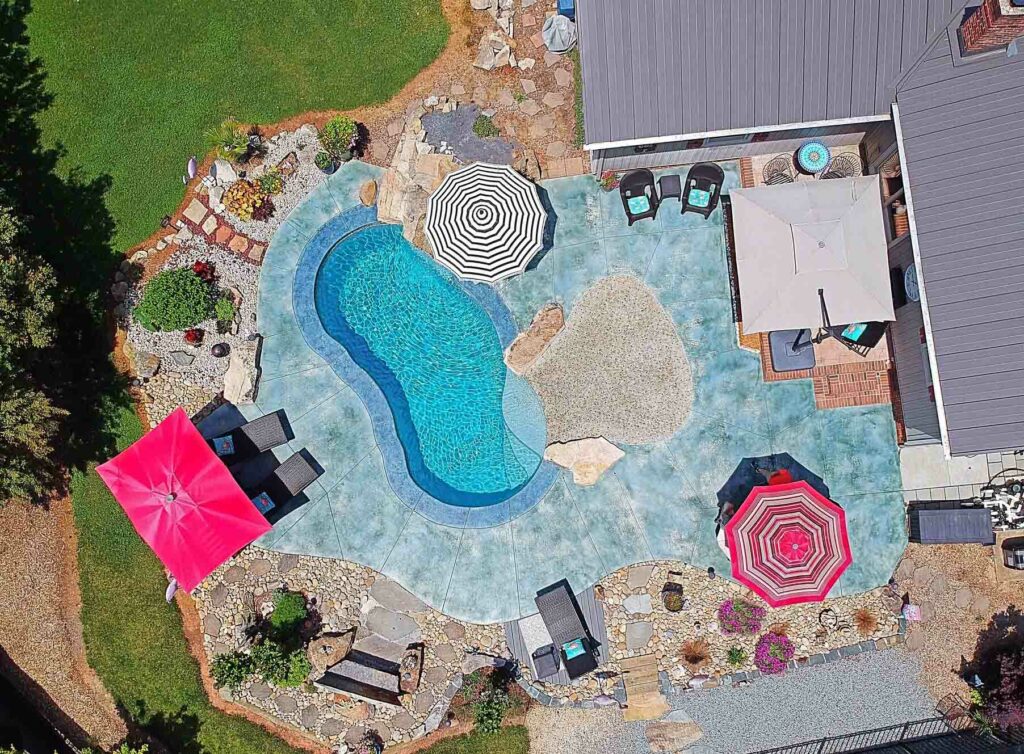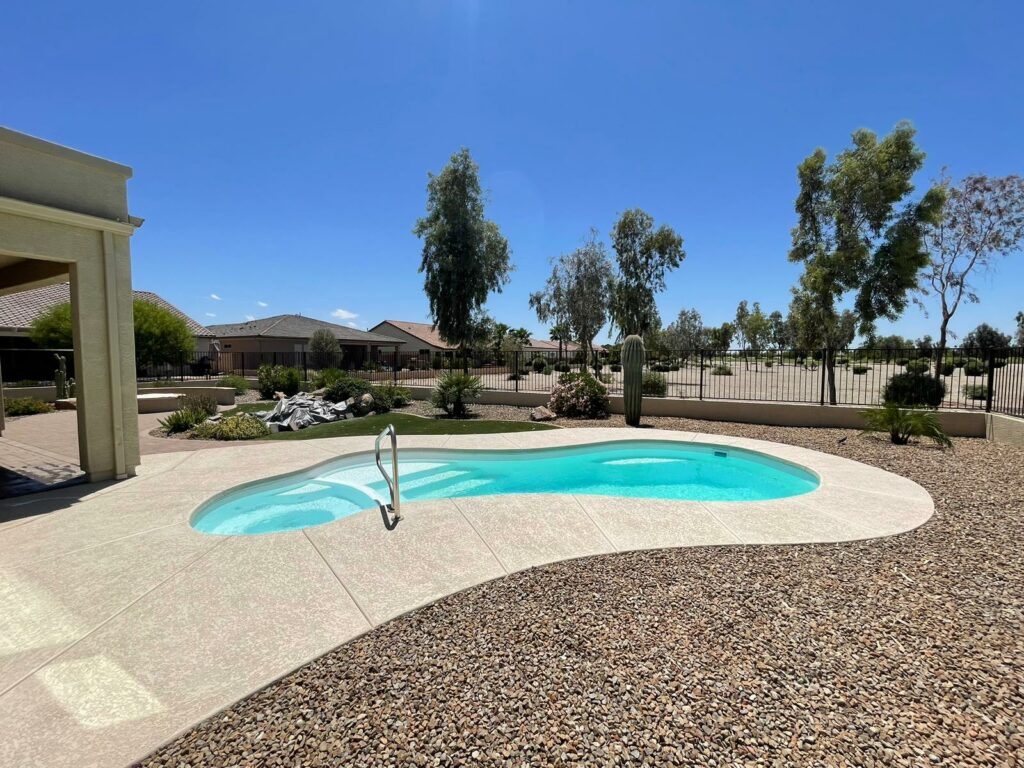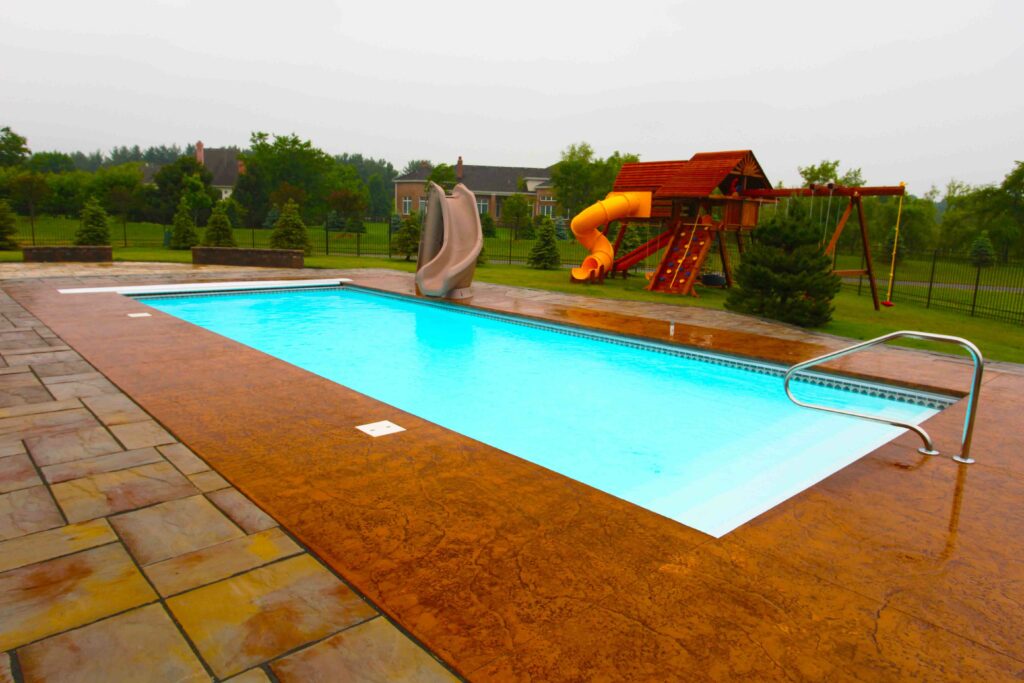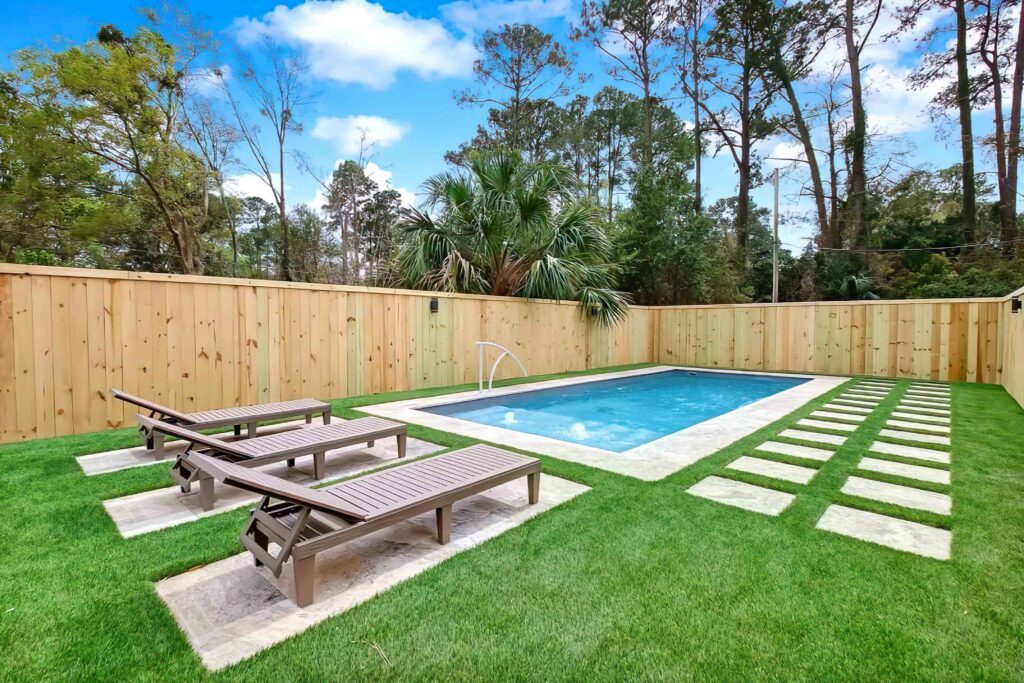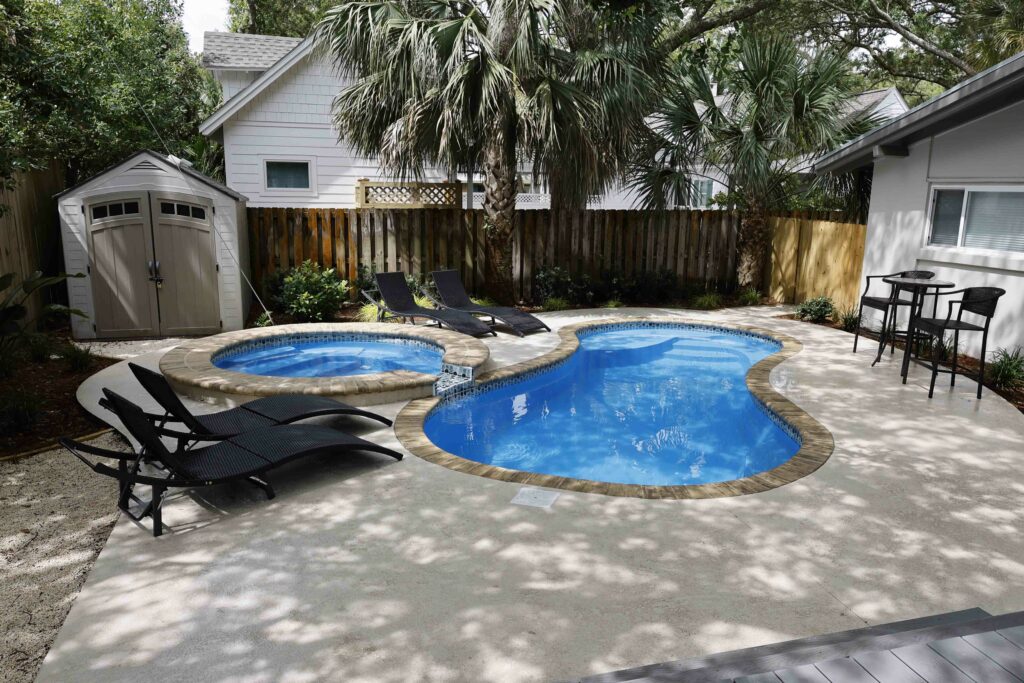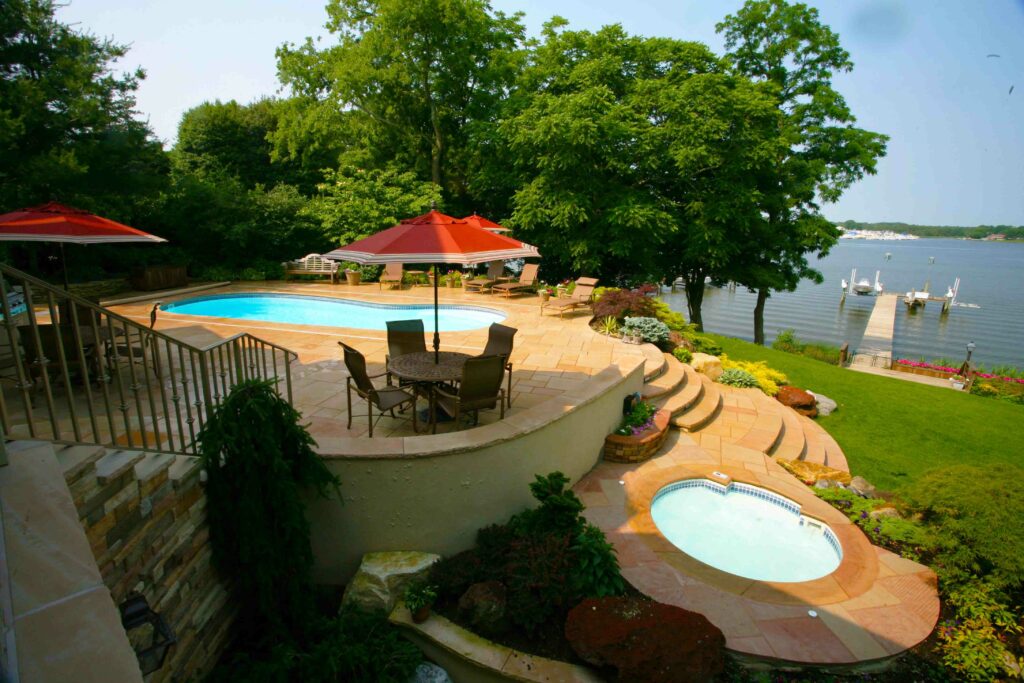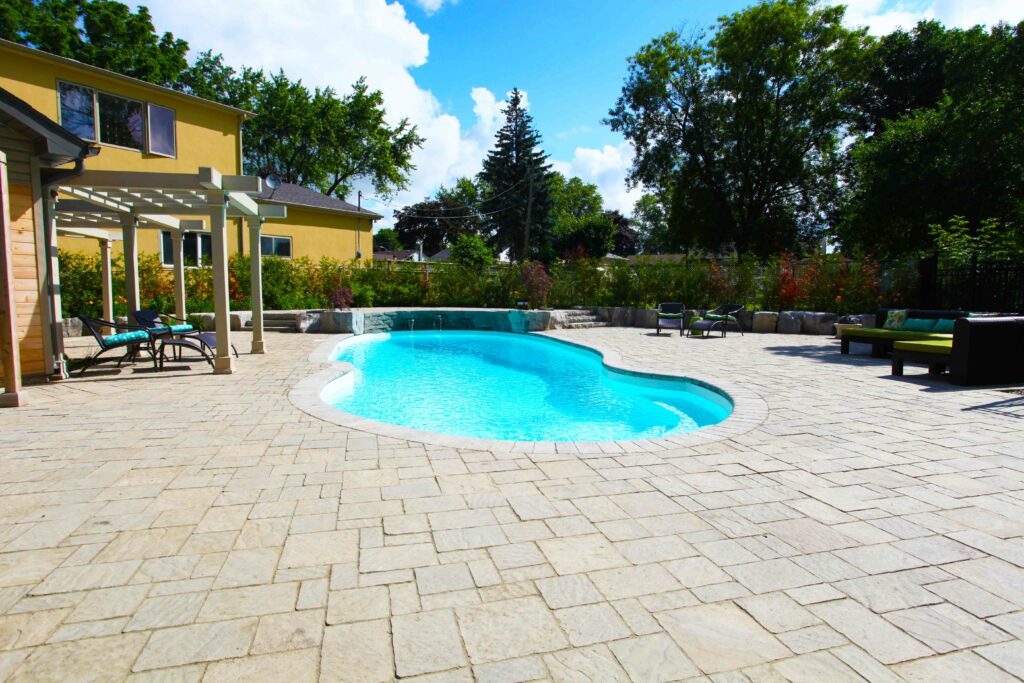Why Fiberglass Pools Are Leading the Market
In recent years, the swimming pool industry has witnessed a significant shift in consumer preferences and technological advancements, steering many towards fiberglass pools as their preferred choice. This change is not just a fleeting trend but a reflection of the inherent advantages that fiberglass pools offer over traditional concrete and vinyl liner pools. Understanding the basics of fiberglass pools and why they have surged to the forefront of the market requires a closer look at their unique properties, the convenience they bring to homeowners, and the broader implications for installation and maintenance.
Let’s first delve into what a fiberglass pool is. Unlike concrete pools, which are built on-site and have a more labor-intensive installation process, or vinyl liner pools, which need a liner replacement every few years, fiberglass pools are factory-molded into a single large piece. This piece is then delivered to a prepared site and installed in one piece. The manufacturing process allows for precise control over shape, size, and features, leading to high-quality products with consistent finishes.
The roots of fiberglass pools go back several decades, but only in recent years have we seen their technology and design evolve to a point where they rival and often exceed other pool types in several key areas. These areas include durability, maintenance, and overall cost-effectiveness, aspects we will explore in-depth throughout this series. But what has specifically contributed to the leading position of fiberglass pools in today’s market? Let’s consider the factors that have propelled their popularity.
Ease of Installation: One of the standout features of fiberglass pools is the ease and speed with which they can be installed. While constructing a concrete pool can take several months from start to finish, a fiberglass pool can be ready for water in as little as a few weeks once the initial excavation is completed and the site is prepared. This quick turnaround is not only convenient for us as homeowners but also reduces labor costs and the overall stress associated with lengthy construction projects.
Durability: Fiberglass pools are highly praised for their durability. The gel coat surface of a fiberglass pool is non-porous, which prevents algae growth and reduces the amount of cleaning and chemical treatment needed. Additionally, fiberglass is flexible and can withstand shifts in the earth and extreme weather conditions better than concrete, which can develop cracks over time.
Design Versatility: Over the years, advancements in manufacturing techniques have expanded the design possibilities available in fiberglass pools. Now, we can choose from a myriad of shapes, sizes, and colors, and even request custom designs that include built-in steps, benches, and ledges. This flexibility allows us to tailor the pool to our specific aesthetic preferences and backyard dimensions, ensuring that each pool not only meets our needs for recreation and relaxation but also enhances the overall beauty of our home.
Cost-Effectiveness and Energy Efficiency: The initial cost of a fiberglass pool may be higher than that of a vinyl liner pool, but the total cost of ownership over the pool’s lifespan is generally lower with fiberglass. This is due to their minimal maintenance requirements and reduced need for repairs. Furthermore, the insulating properties of fiberglass help maintain water temperature, which reduces heating costs and saves energy.
As we move through this series, we’ll explore each of these points in more detail, illustrating not only why fiberglass pools have come to lead the market but also why they might be the best option for us as homeowners looking to invest in a long-term, hassle-free aquatic environment for our families.
In the coming sections, we will delve deeper into the specific benefits of durability and longevity, where we’ll discuss how the robust nature of fiberglass stands up to everyday wear and tear and natural elements. Following that, our focus will shift to the practical aspects of installation and the ongoing maintenance requirements, shedding light on the efficiency and cost-saving measures inherent to owning a fiberglass pool. Each of these aspects plays a crucial role in why fiberglass pools are not just a viable choice but a superior one in many regards. Join us as we navigate the depths of these advantages to better understand why increasing numbers of homeowners are choosing fiberglass pools for their durability, ease of installation, and overall value.
Durability and Longevity
When it comes to selecting a swimming pool, durability and longevity are top considerations for homeowners. Fiberglass pools excel remarkably in these areas, offering compelling advantages that have contributed significantly to their market leadership. This section delves into why fiberglass is synonymous with resilience and how its inherent properties ensure a long-lasting pool experience.
Inherent Material Strength
Fiberglass pools are constructed from a composite material made primarily of fine glass fibers woven together, which are then reinforced with a polymer resin. This combination results in a robust, flexible material that can withstand significant stress without breaking or losing shape. Unlike concrete pools, which are prone to cracking under pressure or shifting soil conditions, fiberglass flexes slightly, accommodating minor earth movements without damage. This inherent flexibility greatly reduces the risk of structural failures, a common problem in regions experiencing frequent temperature swings or geological shifts.
Gel Coat Protection
The interior surface of a fiberglass pool is finished with a smooth, protective layer known as a gel coat. This gel coat is not only aesthetic, providing a shiny, attractive finish, but it also serves several protective functions:
Barrier to Chemicals and Stains: The gel coat is non-porous, meaning it doesn’t absorb chemicals or algae, which are prevalent issues in pools. This resistance to absorption keeps the pool looking new without the need for frequent, strenuous cleaning and reduces the quantity of chemicals required to maintain pH levels and cleanliness.
UV Resistance: The gel coat is treated to resist ultraviolet (UV) light degradation, preventing the color of the pool from fading due to sun exposure. This UV resistance ensures that the pool not only maintains its structural integrity but also its aesthetic appeal over many years.
Low Impact of Wear and Tear
The day-to-day use of a swimming pool can be demanding, with constant exposure to water, chemicals, and human activity. Fiberglass pools handle this daily stress better than other types:
Scratch Resistance: The smooth surface of the gel coat minimizes scratches and dents from general use or cleaning tools.
Colorfastness: The color of fiberglass pools is integrated into the gel coat, which helps prevent fading and discoloration. Even after years of exposure to sun and chemicals, fiberglass pools often look as vibrant as the day they were installed.
Longevity Compared to Other Pool Types
When evaluating the longevity of different pool types, fiberglass consistently comes out on top:
Vinyl Liner Pools: These pools require liner replacements roughly every 5 to 9 years, depending on maintenance and usage. The liners are susceptible to tears and leaks, leading to more frequent need for costly repairs and replacements.
Concrete Pools: Concrete is porous and requires more chemicals and filtration to stay clean. Concrete pools also need resurfacing every 10 to 15 years, a process that can be both expensive and time-consuming.
In contrast, fiberglass pools can last for decades with minimal intervention. Many manufacturers offer warranties of 25 years or more, reflecting confidence in the longevity of their products.
The Impact of Reduced Maintenance on Durability
The durability of fiberglass pools is further enhanced by their low maintenance requirements. Less maintenance not only means easier care but also translates into less wear and tear over time:
Chemical Stability: Fiberglass does not react with pool chemicals, meaning that the structural integrity of the pool is not compromised by the regular use of chlorine and other sanitizers.
Reduced Equipment Strain: Since fiberglass pools maintain cleaner surfaces with less chemical and filtration demands, there’s less strain on pool pumps and other mechanical systems. This can extend the life of these systems and reduce overall operating costs.
User Testimonials and Long-Term Satisfaction
Feedback from long-term owners of fiberglass pools often highlights their satisfaction with the structural integrity and minimal upkeep. Stories of fiberglass pools lasting well beyond their warranty periods with little to no degradation in quality are common, underscoring the material’s longevity.
As we progress in our exploration, it becomes clear that the choice of a fiberglass pool is a choice for a stress-free, durable backyard feature. This assurance of durability and longevity not only meets the immediate needs of enjoying a swimming pool but also addresses the long-term considerations of value and hassle-free ownership.
In the upcoming section on “Ease of Installation,” we will transition from the enduring nature of fiberglass pools to how they are uniquely suited to quick and efficient installation processes. This will further illuminate how the structural benefits of fiberglass are matched by practical advantages during the installation phase, making it a preferred choice for homeowners who value both quality and convenience.
The installation of a swimming pool can be a major project involving significant time, effort, and disruption to daily life. However, one of the standout benefits of fiberglass pools is their ease of installation. This section explores how the pre-fabricated nature of fiberglass pools not only speeds up the installation process but also minimizes the hassle and disruption typically associated with pool construction.
Pre-Fabricated Convenience
Fiberglass pools are unique in that they are manufactured off-site in a controlled factory environment. This pre-fabrication process has several distinct advantages:
Quality Control: Each pool is crafted under strict standards in a controlled setting, which ensures high quality and consistency. Potential issues can be addressed before the pool ever arrives at your home, reducing the likelihood of unexpected problems during installation.
Customization Before Production: Despite being pre-made, fiberglass pools offer a variety of designs and features. You can choose from different shapes, sizes, colors, and finishes, as well as additional features like integrated steps, benches, and even tanning ledges.
Streamlined Installation Process
The actual process of installing a fiberglass pool is markedly faster and less complex than that of concrete or vinyl liner pools:
Step-by-Step Installation:
Site Preparation: The first step involves preparing the site. This includes excavating the area where the pool will be placed, which is done to precise dimensions to ensure a perfect fit.
Pool Arrival: The pool shell is delivered in one piece to the site. Its arrival marks a significant phase where you can begin to see the transformation of your backyard.
Placement and Adjustment: Using a crane, the fiberglass shell is carefully lifted and lowered into the excavated hole. Adjustments are made to ensure the pool sits level.
Backfilling: Once in place, the gap between the pool shell and the earth is backfilled, typically with gravel or sand, which is easier to handle and settle than the materials needed for other types of pools.
Hooking up the Equipment: Plumbing and electrical connections are made, linking the pool to filtration and heating systems.
Water and Finishing Touches: The pool is filled with water, and simultaneous work begins on decking, landscaping, and other finishing touches around the pool.
Reduced Installation Time
One of the most appealing aspects of fiberglass pools is the reduced installation time:
Timeline: From start to finish, the installation of a fiberglass pool can be completed in as little as a week or two, a fraction of the time required for building a concrete pool, which can take several months.
Immediate Use: The quick installation means you can be swimming in your new pool almost immediately after the project begins, a significant advantage, especially in regions with shorter warm seasons.
Less Disruption and Mess
The efficiency of installing a fiberglass pool also means less disruption to your home and daily life:
Less Construction Traffic: Because the pool arrives in one piece and requires less heavy construction work, there are fewer days when heavy machinery and workers are on-site.
Cleaner Installation: Unlike concrete pools, which require significant on-site mixing and pouring of materials, the installation of a fiberglass pool involves less mess and fewer raw construction materials.
Cost Implications of Fast Installation
The quick installation process also has financial benefits:
Reduced Labor Costs: Shorter installation times mean fewer labor hours, which can significantly reduce the cost of installation.
Lower Overall Costs: With fewer days of work and less construction material needed, the overall cost of installing a fiberglass pool can be lower than that of a concrete or vinyl liner pool.
In summary, the ease of installation of fiberglass pools represents a significant advantage over other types. This streamlined process not only ensures a faster route to enjoying your new pool but also offers less disruption during the installation, better quality control, and potentially lower costs. These factors play a crucial role in the rising popularity of fiberglass pools among homeowners who value both convenience and quality.
As we move forward, our next section will focus on “Low Maintenance Requirements.” This will connect seamlessly with the points discussed here, as the ease of installation is just the beginning of the long-term benefits offered by fiberglass pools. We will explore how the characteristics that make these pools easy to install also contribute to their overall low maintenance needs, enhancing their appeal as a practical and enjoyable addition to any home.
Low Maintenance Requirements
Choosing a fiberglass pool comes with the significant benefit of low maintenance, which is a crucial factor for many homeowners. The design and materials of fiberglass pools reduce the time and resources needed for upkeep, providing a more carefree swimming experience. This section delves into the specific aspects of fiberglass pools that contribute to their reduced maintenance requirements, ensuring you understand why they are a superior choice for a hassle-free backyard pool.
Non-Porous Surface
The most significant feature of fiberglass pools that contributes to their low maintenance is the gel coat surface, which is non-porous:
Algae Resistance: Algae formation is a common issue in pools, often requiring regular cleaning and chemical treatments. The non-porous surface of fiberglass pools prevents algae from embedding into the pool walls, making algae much easier to control and remove. This results in less frequent and less intensive cleaning.
Chemical Stability: Because the gel coat doesn’t absorb chemicals like chlorine, the chemical balance in a fiberglass pool is more stable. This stability means you spend less time adjusting water chemistry and buying fewer chemicals over the life of the pool.
Durability of the Gel Coat
The durability of the gel coat not only enhances the pool’s appearance but also plays a crucial role in reducing maintenance:
Scratch and Stain Resistance: The gel coat is tough against physical damage and staining. This resilience means fewer cosmetic repairs and less need for surface cleaning compared to other pool types.
Long-lasting Finish: The aesthetic of a fiberglass pool is preserved over time, reducing the need for resurfacing. Concrete pools, for instance, need to be resurfaced every 10 to 15 years, which can be a costly and time-consuming process.
Simplified Cleaning Process
The design and surface of fiberglass pools simplify the cleaning process:
Smooth Surface: The smoothness of the gel coat not only feels pleasant but also makes it difficult for dirt and debris to adhere. A quick, light cleaning is often sufficient to keep the pool clean, unlike rougher surfaces that might require aggressive brushing.
Integrated Features: Many fiberglass pools come with built-in features such as steps and benches that are molded into the design, without sharp corners or awkward angles where dirt can accumulate. This integration makes the entire pool easier to clean.
Efficient Circulation Systems
Fiberglass pools are often designed with efficient circulation systems that further reduce maintenance needs:
Effective Filtration: The design of fiberglass pools often includes strategically placed skimmers and return jets to create optimal water circulation. This efficient flow helps distribute chemicals evenly and keeps debris moving towards the filtration system, reducing the workload on the system and the need for manual cleaning.
Less Mechanical Wear and Tear: With more stable chemical levels and less debris, the filtration and pump systems experience less wear and tear, extending their lifespan and reducing the frequency and cost of replacements.
Impact of Reduced Maintenance on Lifestyle
The low maintenance requirements of fiberglass pools have a direct impact on the lifestyle of the pool owner:
More Time to Enjoy: Less time spent on maintenance translates to more time available for enjoying the pool. This benefit is particularly appealing during the swimming season when every hour counts.
Reduced Operating Costs: Over the lifespan of the pool, the reduced need for chemicals, less frequent repairs, and lower energy use for pumping and filtration contribute to significant cost savings.
Environmental Benefits
The eco-friendly nature of fiberglass pools is an indirect result of their low maintenance needs:
Less Chemical Use: Using fewer chemicals is not only good for your wallet but also better for the environment. Reduced chemical use results in less pollution and a smaller environmental footprint.
Energy Efficiency: Efficient circulation and heating due to the pool’s insulative properties mean less energy consumption, aligning with greener living standards.
In conclusion, the low maintenance requirements of fiberglass pools are a key factor in their popularity. These pools provide a clean, durable, and cost-effective solution that fits well into a busy lifestyle, allowing more leisure time and less labor. The benefits extend beyond simple convenience, offering long-term financial savings and environmental advantages.
As we look ahead to the next section on “Energy Efficiency and Cost-Effectiveness,” we will build on the understanding that the features making fiberglass pools easy to maintain also contribute to their overall efficiency and cost-saving potential. This connection will help illustrate why fiberglass pools are not only easy to care for but also economically and environmentally prudent choices.
Energy Efficiency and Cost-Effectiveness
The decision to install a swimming pool is significant, impacting not only the aesthetics and functionality of one’s home but also the long-term financial and energy costs associated with maintaining such a leisure facility. Fiberglass pools stand out in the market for their energy efficiency and cost-effectiveness, traits that make them highly attractive to homeowners. This section explores how these pools manage to provide both immediate and ongoing financial benefits, as well as contributing positively to energy conservation efforts.
Thermal Efficiency
Fiberglass pools excel in thermal efficiency due to the inherent properties of fiberglass as an insulating material:
Heat Retention: Fiberglass acts as a natural insulator. This quality means that water in a fiberglass pool tends to stay warmer for longer periods, reducing the need for constant heating. Homeowners can enjoy extended swimming seasons even in cooler climates without incurring high energy costs typically associated with heating a pool.
Reduced Energy Consumption: Because the pool water retains heat well, the energy used to heat the pool is significantly less than that required for pools made of materials that do not insulate as effectively, such as concrete.
Durability Leads to Cost Savings
The inherent durability and longevity of fiberglass pools contribute directly to their cost-effectiveness:
Less Frequent Repairs: As discussed earlier, the robust nature of fiberglass reduces the likelihood of damage that would otherwise require costly repairs. The non-porous surface resists algae growth and staining, which can degrade other types of pool materials and lead to expensive maintenance.
No Need for Resurfacing: Unlike concrete pools, which may need resurfacing every 10 to 15 years, fiberglass pools typically do not require such maintenance. This avoidance of major refurbishments represents a significant saving over the lifetime of the pool.
Low Maintenance Costs
The simplicity and efficiency of maintaining a fiberglass pool also play a crucial role in its cost-effectiveness:
Reduced Chemical Use: The chemical stability of fiberglass means fewer chemicals are needed to maintain pH levels and cleanliness, lowering ongoing costs for pool chemicals.
Simpler Cleaning Regimes: As mentioned, the non-porous surface and integrated design features of fiberglass pools make them easier to clean, reducing both the time and cost associated with pool maintenance. This ease of maintenance not only saves money but also reduces the wear and tear on pool cleaning equipment.
Efficient Circulation Systems
Fiberglass pools often incorporate advanced circulation systems that enhance their energy efficiency:
Optimized Water Flow: These systems are designed to maximize the efficiency of water flow, ensuring that the water is evenly heated and chemically balanced. This design reduces the energy required by pumps and heaters to maintain optimal pool conditions.
Longer Equipment Lifespan: Efficient circulation contributes to less strain on pool pumps and heating systems, extending the lifespan of these expensive components and reducing the frequency of replacement or repair.
Cost-Effectiveness Over Time
The initial cost of a fiberglass pool might be higher than some alternatives, but the total cost of ownership tends to be lower when spread over the pool’s lifetime:
Capitalizing on Longevity: The extended lifespan of fiberglass pools means that the initial investment pays dividends for many years beyond what might be expected with other pool types.
Reduced Overall Expenses: When combining reduced heating costs, fewer chemicals, less frequent repairs, and minimal maintenance, the overall cost of owning a fiberglass pool is typically lower than that of other types.
Environmental Impact and Sustainability
Energy efficiency in pool management not only saves money but also aligns with broader environmental goals:
Lower Carbon Footprint: By using less energy for heating and circulating pool water, fiberglass pools contribute to a lower overall carbon footprint for home leisure activities.
Sustainable Pool Ownership: The long lifespan and reduced need for chemicals make fiberglass pools a more sustainable option, minimizing the environmental impact associated with frequent pool maintenance and repairs.
In conclusion, the energy efficiency and cost-effectiveness of fiberglass pools are among their most compelling advantages. These pools offer homeowners not only a beautiful and enjoyable addition to their homes but also a wise financial investment and an environmentally friendly choice. The savings in energy and maintenance costs, combined with the long-term durability and minimal environmental impact, underscore why fiberglass pools are a leading choice in the market.
Looking ahead, the next section, “Design Flexibility and Aesthetics,” will explore another significant advantage of fiberglass pools: their ability to adapt to various design preferences and aesthetic desires. This adaptability further enhances the appeal of fiberglass pools, offering homeowners the opportunity to customize their backyard environments to reflect their personal styles and needs.
Design Flexibility and Aesthetics
In the world of home improvement, the design and aesthetic appeal of any addition are paramount. This is especially true for swimming pools, which serve as a centerpiece in many backyards. Fiberglass pools excel not only in functionality and cost-effectiveness but also in their design flexibility and visual appeal. This section delves into how fiberglass pools meet diverse homeowner needs through a wide range of customizable options and elegant designs.
Customizable Shapes and Sizes
One of the most significant advantages of fiberglass pools is the variety of shapes and sizes available, catering to different tastes and backyard dimensions:
Pre-formed Designs: Fiberglass pools come in numerous pre-formed designs, including classic rectangles, kidney shapes, and freeform curves. This variety ensures that there is likely a pool that fits well with the specific layout and size of any backyard.
Depth Variability: Besides the horizontal dimensions, fiberglass pools offer various depths suitable for different activities, whether it’s shallow areas for children or deeper sections for diving.
Aesthetic Enhancements
Fiberglass pools provide several options that enhance their visual appeal and integrate seamlessly into overall landscape design:
Color Options: The gel coat finish in fiberglass pools is available in a range of colors. This choice allows homeowners to match the pool with the home’s exterior, patio furniture, or landscape themes.
Built-in Features: Many fiberglass pools include built-in underwater benches, tanning ledges, and steps that not only improve functionality but also add to the aesthetic quality of the pool. These features are smoothly integrated into the pool design, enhancing both comfort and style.
Surface and Texture
The gel coat surface of fiberglass pools offers more than just durability and ease of maintenance; it also plays a significant role in the pool’s aesthetic appeal:
Smooth Finish: The smooth surface of the gel coat provides a clean, modern look that is visually pleasing and feels good to the touch. This sleek finish reflects light beautifully, making the water appear sparkling and inviting.
Consistent Quality: Unlike tiled or plastered pool surfaces that can show wear or uneven aging, the gel coat maintains a consistent appearance over time, ensuring that the pool always looks well-maintained and new.
Integration with Outdoor Living Areas
Fiberglass pools are particularly well-suited to integration with other outdoor living features, contributing to a cohesive backyard environment:
Landscaping: The versatility in pool shapes and styles makes fiberglass pools easier to incorporate into a comprehensive landscaping plan. They can be surrounded by garden areas, patios, or decks that enhance the overall outdoor space.
Complementary Features: Homeowners often choose to add water features like waterfalls or fountains, and fiberglass pools are compatible with these additions. Integrating these features can create a dynamic, multi-sensory outdoor experience.
Customization Beyond the Basics
Beyond the standard options, fiberglass pools can also be customized in ways that make each installation unique:
Lighting: LED lighting can be installed in various parts of the fiberglass pool to enhance its nighttime appeal and increase safety. These lights can often change colors, allowing for customization according to the mood or event.
Tile and Decking Choices: While the pool itself is fiberglass, the surrounding areas can be customized with different materials and designs. Choices in decking materials, from natural wood to composite or pavers, allow for complete customization of the pool area.
Advantages in Modern Manufacturing
The advancements in fiberglass pool manufacturing technology have greatly expanded design possibilities:
Precision Molds: Modern manufacturing techniques allow for precision in pool molds, which means that even complex shapes and features can be accurately and consistently reproduced.
Quality Finishes: High-tech finishes are applied to fiberglass pools during the manufacturing process, enhancing their ultraviolet (UV) resistance and overall durability. This ensures that the pools not only look good on installation but retain their appearance for years.
In conclusion, the design flexibility and aesthetic options available with fiberglass pools are vast. These pools can be adapted to suit any taste or backyard space, from the simplest designs to the most elaborate. The ability to customize shapes, sizes, colors, and finishes, along with the integration of additional features and enhancements, makes fiberglass pools a leading choice for those who prioritize both functionality and style in their home improvements.
Conclusion
As we reflect on the comprehensive exploration of fiberglass pools, it becomes evident why these pools have gained a leading position in the market. The appeal of fiberglass pools extends well beyond their aesthetic versatility, touching on aspects crucial to homeowners today—durability, ease of installation, low maintenance, energy efficiency, and cost-effectiveness. This conclusion aims to encapsulate the major points discussed, reinforcing why fiberglass pools are not just a popular choice, but a smart investment for the future.
Durability and Longevity: Fiberglass pools stand out for their exceptional durability and longevity. The robust nature of fiberglass as a material, combined with the protective qualities of the gel coat, ensures that these pools can withstand the rigors of time and nature without succumbing to the common ailments that plague pools of other materials, such as cracking and leaking. This resilience translates into a long-lasting pool experience with minimal disruption from repairs, providing peace of mind for homeowners.
Ease of Installation: The pre-fabricated design of fiberglass pools significantly simplifies the installation process. Unlike concrete and vinyl pools, which require weeks or even months to construct, fiberglass pools can be installed in a matter of days. This rapid installation not only reduces labor costs but also minimizes the inconvenience and mess typically associated with pool construction. For families eager to enjoy their new backyard feature, this quick turnaround is invaluable.
Low Maintenance Requirements: A major selling point of fiberglass pools is their low maintenance needs. The non-porous surface of the gel coat is inherently resistant to algae and staining, which significantly cuts down the time and cost associated with keeping the pool clean. The chemical stability of the material also means less ongoing expense for water treatment, and the integrated design elements eliminate many of the nooks and crannies where dirt can accumulate, making the entire cleaning process quicker and more efficient.
Energy Efficiency and Cost-Effectiveness: The insulating properties of fiberglass contribute to better heat retention, reducing the energy required for heating the pool. This efficiency is a boon for both the environment and the homeowner’s utility bills. Furthermore, the long-term cost benefits of owning a fiberglass pool cannot be overstated. The combination of reduced maintenance, minimal repairs, and energy savings means that the total cost of ownership of a fiberglass pool is often much lower than that of other types of pools.
Design Flexibility and Aesthetic Appeal: Fiberglass pools offer a wide array of customizable options that cater to various tastes and backyard layouts. Homeowners can choose from a multitude of shapes, sizes, and colors, and add features like built-in steps, benches, and even sophisticated lighting systems. This flexibility ensures that each pool can be tailored not just to the functional needs of the family but also to enhance the overall beauty and value of the home.
In wrapping up, it’s clear that fiberglass pools provide a multitude of advantages that make them a preferable choice over other types of pools. The synthesis of convenience, durability, and beauty they offer, coupled with their long-term financial and practical benefits, positions fiberglass pools as a smart choice for any homeowner considering a new or replacement pool.
While this series has covered many core benefits of fiberglass pools, the ongoing innovations in their design and manufacture, and the positive feedback from countless homeowners, continue to reinforce their market leadership. These pools represent not just a lifestyle enhancement, but a wise investment in a home’s value and a family’s quality of life.
As homeowners increasingly look for home improvement options that offer both immediate satisfaction and long-term benefits, fiberglass pools stand out as a compelling choice. With their superior durability, ease of maintenance, energy efficiency, and aesthetic appeal, they offer an unbeatable combination of features that meet the needs of modern homeowners, making them a leading choice in today’s pool market.
